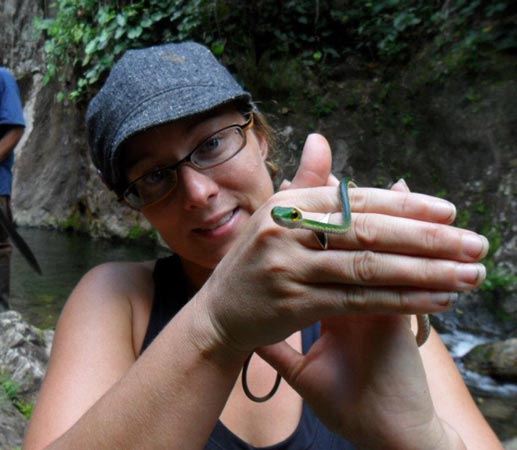
Two UNB alumni are conserving Belize’s natural and cultural heritage through education, community projects and local and international networking. They believe that ecological conservation can only happen with community involvement.
Three years ago, Mathieu Charette (MSc’05) and Vanessa Kilburn (BSc’04) started the Toucan Ridge Ecology and Education Society (T.R.E.E.S.), a grassroots research and educational organization on the coast of Belize. It is home to a small biologist-managed facility and boasts some of the highest biodiversity in the country.
T.R.E.E.S. hosts ecological education programs for local and international students and eco-tourists interested in learning about tropical biodiversity, community development, and organic agriculture and food sustainability.
“By training international and local students in environmental and wildlife management field research techniques and data collection protocols, we will gain a greater knowledge on the biodiversity of Belizean fauna and flora. With the help of international scientific collaborators, this knowledge is compiled into peer-reviewed publications, Belizean government reports and regulations, field guides, and other publications that will increase the global visibility of Belizean fauna and flora and aid in their management and ultimately their conservation.” (Source: treesociety.org)
Both Charette and Kilburn were students of Tony Diamond, a research professor in both biology and forestry and environmental management at UNB. In March 2015, Diamond brought a group of about 10 students to Belize on a biology tour – just as he had done with Kilburn several years earlier.
"Vanessa was on the first international field ecology course we ever took to Belize,” says Diamond. “That was in 2002 and she fell in love with the place.”
Tony has offered international field ecology courses every other year for more than 10 years. The past three courses have been at T.R.E.E.S.
"The site has a wide variety of habitats,” he says. “It has deep rainforest, fast flowing streams and two abandoned orchards which are quite overgrown, but are great places for seeing wildlife, particularly birds and insects."
As part of Diamond's international course, students are required to do a field project, which they design and carry out themselves. They also go on day trips to other sites and have time to explore the country.
"I think it broadens their appreciation of the world, it broadens their appreciation of other environments,” says Diamond. “So from a biology point of view, it's a chance to see other ecosystems and other kinds of wildlife that we just don't get in New Brunswick. But also for growing up as adults, they see another culture, another part of the world.”
While this type of international course certainly shaped Vanessa’s future, Tony said it impacts all of the students who participate.
“Any of them who have gotten in touch later say that the trip was a life-changing experience. So I've never had any doubt that this is worthwhile,” he says.